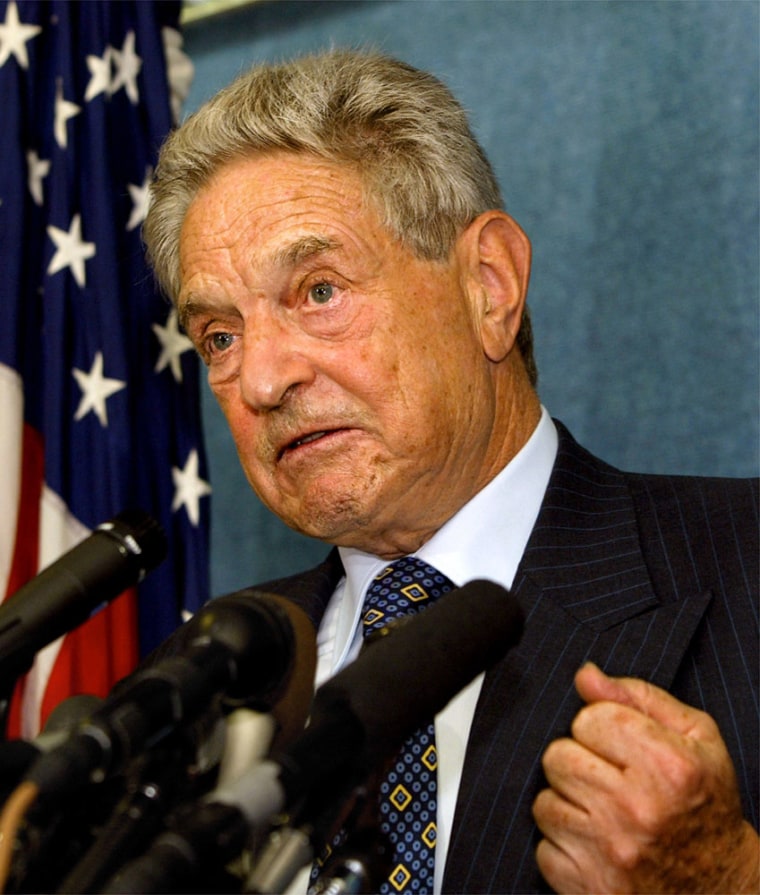There are more people giving $1 million or more to partisan political groups now than before Congress passed a law aimed at taking seven-figure contributions out of elections, new figures show.
About five dozen people are on the list of $1 million-plus donors to partisan groups active in this year's presidential and congressional races. That compares with about three dozen during the heyday of party "soft money" in the 2002 election cycle and about two dozen in 2000, according to data compiled by the nonpartisan Political Money Line campaign finance tracking service.
Some of those who wrote big checks in 2002 when national party committees and members of Congress could still accept them are giving even more now — this time to nonparty partisan groups running ads and get-out-the-vote campaigns.
The top giver is George Soros, the billionaire financier who jump-started pro-Democratic efforts to find a way to keep spending the unlimited checks the Democratic Party can no longer collect. Soros, who has given roughly $24 million to various groups opposing President Bush, said he donated so much to the so-called 527 groups to help the Democrats compete financially with Republicans.
"I have to make the playing field more even," Soros said in a telephone interview with The Associated Press. "I used the available legal means. I didn't invent 527s. They were part of the law."
Soft-money ban in progress
The flood of unlimited donations, despite a broad ban on the use of such soft money to influence federal races, has so alarmed the law's supporters that they are making legislation to stop it a priority in the next Congress.
"We still have work to do," said Rep. Martin Meehan, D-Mass., a lead House sponsor of the soft-money ban. Meehan and other supporters of the law are suing the Federal Election Commission for failing to rein in the partisan soft-money groups. On the other hand, he said millionaires can always spend money on politics because of the Supreme Court.
The court long has held that individuals have a constitutional right to spend as much of their own money as they wish on political speech, such as airing political ads. But Meehan and other campaign finance watchdogs argue they do not necessarily have a right to give unlimited donations to partisan groups spending in federal elections.
This election cycle, wealthy individual donors have helped nonparty 527s double their fund raising overall, playing a bigger role in the finances of major groups than have the corporations and unions that used to give millions to the national party committees.
In all, tax-exempt, political groups registered with the IRS as 527s have raised more than $460 million in the 2003-04 election cycle, compared with about $221 million in 2001-2002, a Political Money Line analysis found.
Though prolific giving by Soros and other Democratic supporters started months before pro-Bush groups began aggressively raising big checks, the top-10 list of individual 527 donors is now split between Democrats and Republicans.
On the anti-Bush side, top donors besides Soros include Ohio businessman Peter Lewis, at least $23 million; Hollywood executive Stephen Bing, roughly $14 million; and banking executives Herbert and Marion Sandler, at least $9.5 million.
Top donors to pro-Bush groups include Houston homebuilder Bob Perry, whose $8 million in giving includes donations to Swift Boat Veterans for Truth, whose TV ads accused John Kerry of lying about his decorated Vietnam War service.
Peter Buttenwieser, who gave about $1 million to the Democratic Party in the two elections before the new law took effect, decided against writing seven-figure checks to pro-Democratic 527s. He said they already have enough major donors.
Buttenwieser said such giving runs counter to campaign finance reform, but he nonetheless praised Soros, Lewis and the political groups they help finance, such as America Coming Together, a pro-Kerry get-out-the-vote organization. They have helped Democrats compete, he said.
"I think that the best time to sort of really get into full campaign finance reform is when there are no loopholes and the whole thing is really fair. I don't think it is right now," Buttenwieser said.
